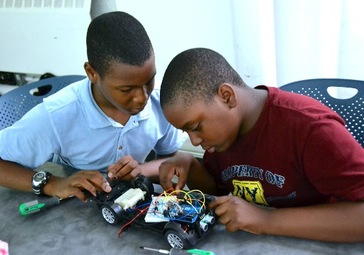NYU-Poly hosts STEM-focused summer program
Deutsche Bank supported the creation and establishment of NYU-Poly’s Science of Smart Cities summer program, which provided free daily workshops to NYC public middle school students for four weeks. Deutsche Bank volunteers also provided weekly assistance.
Polytechnic Institute of New York University (NYU-Poly) is the second oldest private institute of science and engineering in the United States. NYU-Poly’s Center for K12 STEM Education connects university faculty and students with New York City students, teachers, school leaders and nonprofit organizations in order to create opportunities for students to study advanced STEM (science, technology, engineering and math) skills and content. The Center creates and teaches age-appropriate curricula in the STEM disciplines, provides professional development and training to K12 teachers, and designs education programs.
Deutsche Bank Americas Foundation supported NYU-Poly’s Center for K12 STEM Education to develop the curriculum for and institute the Science of Smart Cities program. This summer, through hands-on activities, guest lectures, field trips and service learning opportunities, students focused on four integrated weekly themes related to a ‘smart’ city – energy, food and water, transportation and wireless communications.
With the engineering and technology skills developed over the summer, students used real-world materials and technologies to create their own model sustainable city. Students and program instructors blogged about their experiences throughout the summer. Read the blog here.
Expanding on Deutsche Bank’s grant support, volunteers from the Global Technology AS Pricing and High Frequency Trading group, led by Dirk Manelski, helped facilitate workshop sessions each week. Volunteers also helped students complete hands-on projects that contributed to their culminating project of a model smart city.
“Learning what excites these kids, seeing their minds at work and channeling all the energy and possibilities that come with youth – I may have learned as much from them as they did from me,” said Vimal Lad, a vice president in Global Technology who served as a volunteer. “I saw a shift in their thought process when challenging them to justify their idea to me and others.”
For News12 Brooklyn coverage of the Science of Smart Cities program, please click here.

